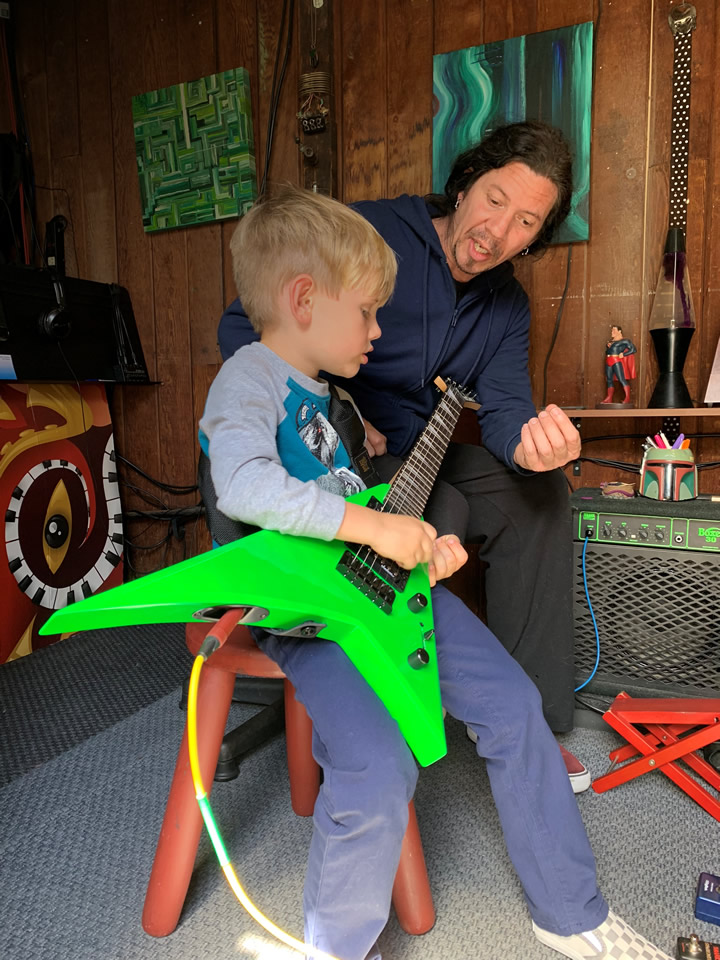Guitar Lessons for Kids
Guitar Lessons for Kids are Now Available in San Diego and Online via Webcam
Students as young as five are accepted. Younger guitar students will learn to read music, understand and apply music theory, learn songwriting skills and advance their technique. Mike allows students to send song requests. Kids can learn pop guitar, country guitar, folk guitar, finger-picking guitar, classical guitar, jazz guitar, bluegrass guitar, flamenco guitar, blues guitar, funk guitar, metal, ska, reggae, and even punk. Mike currently teaches guitar lessons for kids in grade school, middle school and high school.
Are Kids Ready for Guitar Lessons?
Parents of young children often ask if their child is ready to begin taking guitar lessons. The answer to this question is largely dependent on the child - some kids will be ready to begin guitar lessons at age seven while others might not be ready until they are ten or even older. Here are a few considerations you'll want to keep in mind before signing up your kid for guitar lessons:
Playing Guitar Requires Dexterity
The biggest physical hurdle young kids generally need to overcome when learning guitar is their lack of fine motor skills and hand strength. Switching chords on guitar strings requires nimble fingers, and many kids don't develop the required level of dexterity until they are eight or nine. Of less importance is overall hand size - there are many 1/2 size guitars available that should feel comfortable for even the smallest hands.
Improving on Guitar Requires Patience and Practice
If your child is enrolled in guitar lessons, they'll invariably be provided with "homework" - chords, scales and songs to memorize and practice. If not worked on routinely, kids will fall behind and frustrate both their guitar teacher and themselves. Mike advocates a minimum of 15 minutes per day of practice.
Forcing Young Kids to Learn Guitar Doesn't Produce Results
You know the story, parents sign kids up for guitar lessons, but after a couple of lessons they lose interest in learning guitar. All the common excuses come up: it's too hard, the guitar is too big, and they're not learning any songs they like. However, parents who just shelled out lots of money for a new guitar forced their kids stick with lessons Unfortunately, when it's finally their choice, they often quit and never come back to playing guitar. Developing a negative impression of guitar lessons early in life can sour kids on playing music in general.
Although all kids are different, here are some guidelines to help you determine when to begin considering guitar lessons.
- Child should be at least five years old. In Mike's experience most kids under five are too young to benefit from formal guitar lessons; learning guitar requires dexterity and levels of concentration most children that age just haven't developed yet. It's not a bad thing and you don't want to rush it.
- Child should displays sufficient hand dexterity. Kids who have not really developed their fine motor skills, guitar lessons will be a struggle. Although playing guitar can help develop these motor skills, maintaining a child's interest during this development if usually pretty tough.
- Child can maintain focus for significant periods of time. If your child doesn't have the attention span to maintain a daily 15-minute practice schedule, consider waiting a while before enrolling them in formal guitar lessons.
- Child shows interest in the guitar. If they're not at all interested in the guitar, pushing them into lessons can create a distaste for something they might have otherwise enjoyed.
Get Them Ready For Lessons Later
Even if your kid isn't ready for guitar lessons today, you can still make the guitar a part of their lives. Introducing kids to the guitar outside the structure of formal guitar lessons can allow them to begin to interact with and appreciate the instrument on their own terms. Here are some ideas that have worked for others.
- Play guitar with your kids. Engage with your kids on their terms - play them some children's songs that they know, and encourage them to sing along. If they want to strum your guitar while you're trying to play - let them!
- Leave a guitar out for your kids to play with. Not your $3200 Taylor or Les Paul Custom, but possibly a smaller entry level instrument. You could even set it up with an open tuning, so they can hit the the open strings, and still sound good. No Pete Townsend finale impressions, but other than that, let them have free reign.
- Give kids positive feedback on what they play.
- Point out guitar parts in the music they like. Make an effort to point out the role the guitar plays in that music.
All Sales are Final

